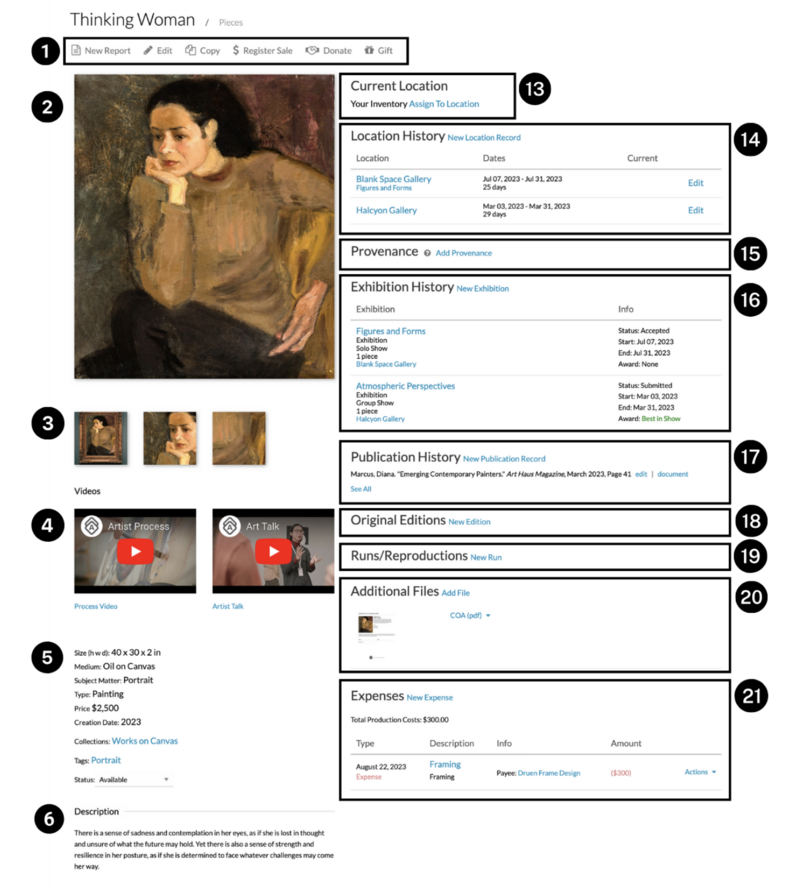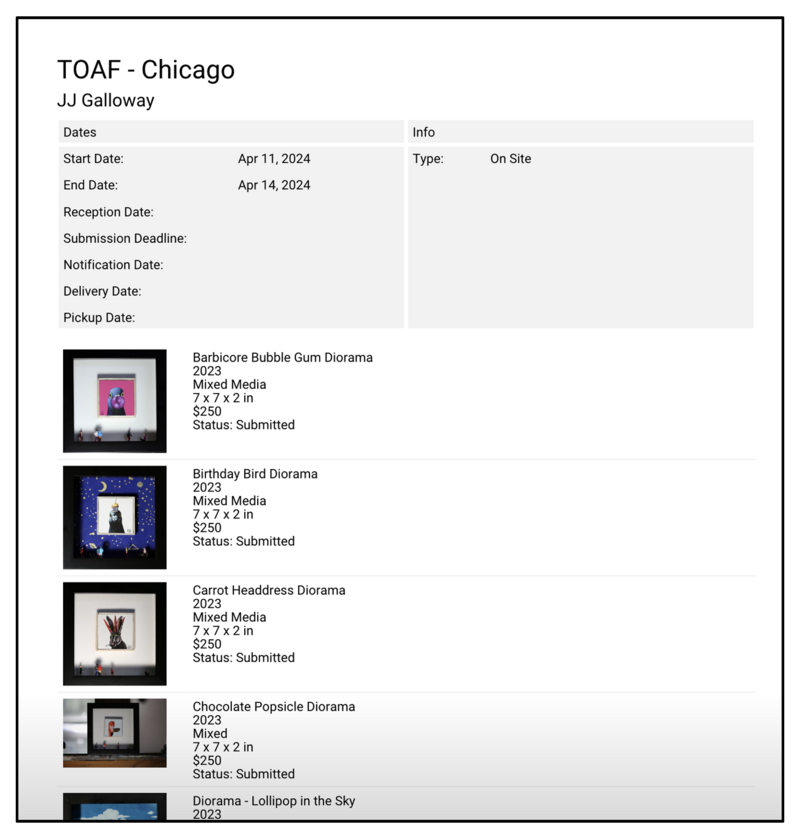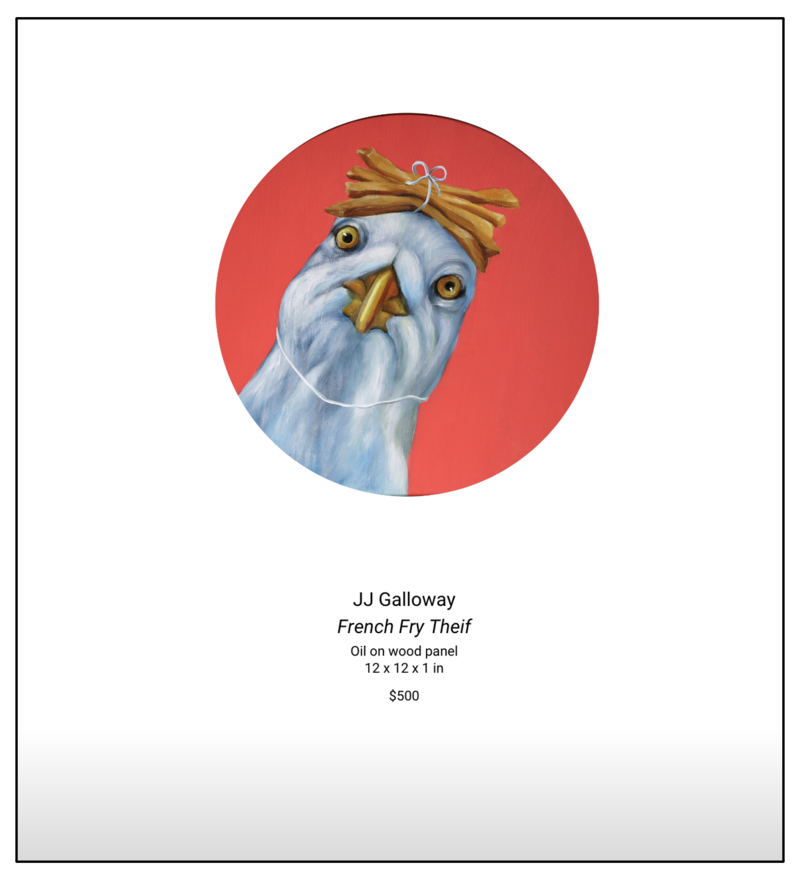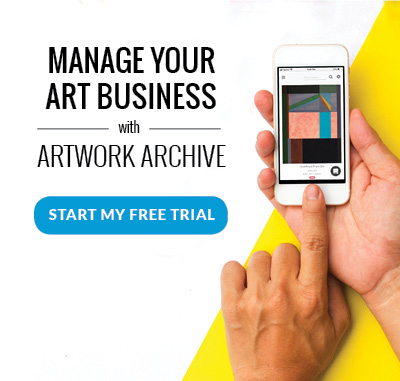.jpg) JJ Galloway in her studio. Photo courtesy of the artist.
JJ Galloway in her studio. Photo courtesy of the artist.
Art Business Diaries: JJ Galloway on Art Business Finances
JJ Galloway is a multi-media artist, gallery owner, and mentor based in the United States. Her journey as a full-time professional artist began in 2000, right after the birth of her son. With a background in public relations and marketing, Galloway hadn't touched a brush since college but was determined to build a career as what she deems her new role as a "mother-artist."
As her family grew, so did her portfolio. "During this time I was learning what my style would look like and laying down the foundations of my art business," Galloway explains. "It can be an unnerving time in an emerging artist's career. You want to know what collectors want, where your collectors are and, at the same time, be authentic to yourself."
While the business side of art-making was initially challenging for Galloway, using Artwork Archive has helped her seamlessly integrate it with her creative process.
Building an Art Business One Sale at a Time
"As a successful full-time artist, gallery owner and mentor, I am in and out of my two Artwork Archive accounts all day," she shares. "As a one-woman show, I need programs like Artwork Archive to help me stay organized and make informed decisions about my business."
Galloway's journey wasn't without its challenges.
"Early on, I was told artists can't make a living and I was just another drop in the bucket of life...so I had something to prove," she recalls. Coming from a modest background, she put herself through college, graduating with a dual degree in Fine Art and Marketing. This combination of skills proved invaluable in her artistic career.
"I've always had a very clear realization that if I wanted to start a full-time fine art business I would need to be smart about the finances," Galloway states. Her approach was pragmatic and cautious: "I would only put into the business what I earned. In other words, there was no nest egg."
This strategy, while demanding patience and perseverance, has paid off. "It's been 24 years in the making, but I built my business one sale at a time," she proudly shares.
.jpg)
Ramen Pigeon No. 1 by JJ Galloway
Consistency and Integrity: Keys to Pricing Success in the Art World
For Galloway, finding the right price for her artwork was a journey of experimentation and persistence.
"As an artist, I had to play with my pricing to find the sweet spot," she explains. With her current body of work being consistent in size and medium, she's been able to establish a stable price point.
The artist-mother-gallerist emphasizes the importance of maintaining price integrity: "I never waiver from [my set] price even when I'm having a bad show with slow sales. I don't devalue the work to ease my ego. The right collector will pay the price for the work."
However, she admits that reaching this point wasn't easy. "It took a lot of time to find that price point by going too low and selling out or too high and selling nothing."
How Galloway Balances Creativity with Finances
Her dual role as an artist and gallerist provides a unique perspective on pricing. "As an independent artist, I find it can be hard to ask enough for my artwork, but as a gallerist, I can see its value. So I meet somewhere in between," she shares.
For Galloway, success in the art world is multifaceted.
"Success as an artist is bringing collectors joy when they see my artwork and hopefully add a piece to their collection. As a small business manager, success is making enough financially to keep the business running. It has to be both," she explains.
The seasoned art professional acknowledges the diverse nature of an artist's career path. "The job description of 'artist' is elastic at best. We all do what we have to do to be able to make our craft. Whether you work in a bookstore, teach, work in an office, whatever, it's all good if that affords you the ability to create."
Remember, it's okay if it takes some time to find your perfect price point and to take other jobs to support your art career as it grows. Galloway's experience shows that a little patience and experimentation can go a long way in building a thriving art career that's both creatively fulfilling and financially viable.
.jpg)
JJ Galloway's Art Fair Booth. Photo courtesy of the artist.
How Artwork Archive Transformed JJ Galloway's Workflow as an Artist
Before discovering Artwork Archive, Galloway used Excel spreadsheets to track her work. However, as her portfolio and sales grew, she quickly outgrew this method.
"I also wanted to figure out where my collectors were located," she recalls. "In the beginning of my art career, I was selling all my art through several online galleries who sold to a national database. I needed an archive program that helped me keep track of what artwork was promised where."
Galloway admits that the transition to a new platform required some effort, but the payoff was worth it.
"With Artwork Archive I was able to enter all the details for each piece so I had it at my fingertips when needed," she explains. "Additionally, I was able to record sales and especially sales locations."
As a gallerist, she also appreciates when other artists use Artwork Archive to keep their artwork organized and send over Inventory Reports to the gallery saying that when artists use the platform, the gallery can simply import their artwork information right into her Organization Account on Artwork Archive and save her a lot of time!
Portfolio Page example on Artwork Archive with French Fry Theif by JJ Galloway.
Artwork Archive Tip: Filling Out An Artwork Record
JJ Galloway uses Artwork Archive to keep track of all the details of her artworks.
"Every time I finish a piece of art I take high-res photos of the artwork and enter those images with all the details about the piece into my Artwork Archive."
See an example of an artwork record below and learn more about each field you can record on Artwork Archive here.

The Power of Detailed Record-Keeping & Keeping an Art Inventory in Your Art Business
As a gallery owner, JJ Galloway has found Artwork Archive to be an indispensable tool for managing financial aspects of her business. "I generate financial reports within Artwork Archive more as a gallery than as an independent artist," she explains.
Galloway's process for onboarding new artists demonstrates the platform's versatility. "When I sign on a new artist for a particular season, we agree to an inventory that I consign from them," she says. "I enter all their artwork information into my archive and generate an inventory report that I send back to them for approval."
This systematic approach ensures accuracy and transparency. "In this way, we can make sure all the artwork details, especially pricing, is accurate," Galloway notes. The benefits extend beyond initial setup, proving valuable during exhibitions as well. "I work from this report while I'm at a show and track all my sales in the archive," she adds.
Learn more about Artwork Archive's financial features
Watch a virtual training session showing you how to manage your art income and expenses in Artwork Archive
Post-exhibition, Artwork Archive continues to streamline operations. "At the end of the show, I generate a sales report for each artist and pay them!" Galloway enthuses. This thorough documentation process has significant advantages: "Keeping these detailed records eliminates any confusion."
By leveraging Artwork Archive's features, Galloway has created a robust system that benefits both her gallery and the artists she represents, ensuring clear communication, accurate record-keeping, and prompt payment.
 Consignment Report example on Artwork Archive from JJ Galloway.
Consignment Report example on Artwork Archive from JJ Galloway.
Artwork Archive Account Types
Artwork Archive offers a range of account types tailored to the needs of artists, collectors, art professionals and organizations. Each account type comes with a set of features and pricing options to suit different requirements and collection sizes.
The best part? You can try any of these account types for free with our 14-day trial, no credit card required.
- Artist Accounts are designed for individual artists who create and manage their own artwork. These accounts are perfect for artists and artist estates.
- Collector Accounts are ideal for individuals, families or small estates looking to organize and manage their private and publicly owned collections. These accounts are perfect for private art collectors, art enthusiasts and patrons, art investors and advisors, family offices and wealth managers, estate managers and executors.
- Organization Accounts are designed for collections, institutions, businesses, and groups that manage, acquire, loan, sell or showcase artworks as part of their operations. These accounts are perfect for: museums and cultural institutions, academic institutions, public art programs, non-profit art organizations and foundations, corporate art collections, art galleries, dealers and consultancy firms, hospitals art collections, airport art collections.
Advice for Emerging Artists:
Galloway offers this advice to emerging artists: "One of the first steps in building a fine art business is getting organized."
"Every time you submit your artwork for something, a show, an online gallery, art representation, anything, you're going to need to have all the details about your artwork ready to go. If you take the time to do it right from the start, you only need to do it once. From then on all the info is at your fingertips!"
She emphasizes, "Your talent is your gift, but it takes more than talent to be successful at a fine art business."
Take the Next Step in Managing Your Art Business
Ready to take control of your art business finances? Learn more about the financial features on Artwork Archive by watching the recorded webinar, "Feature Spotlight: Track Your Art Income, Invoices and Expenses with Artwork Archive" below.
From expense tracking to invoice generation, you'll discover tools designed specifically for artists.



.png)

4ee1.png)
ce65.png)
5759.png)
